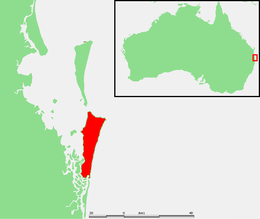North Stradbroke Island
|
Native name: Minjerribah Nickname: Straddie |
|
|---|---|

NASA World Wind Landsat montage
|
|
 |
|
| Geography | |
| Location | Moreton Bay |
| Coordinates | 27°35′S 153°28′E / 27.583°S 153.467°ECoordinates: 27°35′S 153°28′E / 27.583°S 153.467°E |
| Area | 275.2 km2 (106.3 sq mi) |
| Length | 38 km (23.6 mi) |
| Width | 11 km (6.8 mi) |
| Highest elevation | 239 m (784 ft) |
| Administration | |
|
Australia
|
|
| State | Queensland |
| Region | Gold Coast, South East Qld |
| Local government area | Redland City |
| Demographics | |
| Population | 2030 (2011 census) |
| Ethnic groups | Quandamooka people |
North Stradbroke Island (Indigenous: Minjerribah), colloquially Straddie or North Straddie, is an island that lies within Moreton Bay in the Australian state of Queensland, 30 kilometres (19 mi) southeast of the capital Brisbane. Before 1896 the island was part of the Stradbroke Island. In that year a storm separated it from South Stradbroke Island, forming the Jumpinpin Channel. The Quandamooka people are the traditional owners of North Stradbroke island.
At 275.2 square kilometres (106.3 sq mi), it is the second largest sand island in the world. On the island there are three small towns, a number of lakes and beaches along most of the seaward coastline with rocky outcrops at Point Lookout. An Aboriginal presence on the island has been long and ongoing, resulting in a successful native title determination. Tourism is a major and growing industry on the island. The island has been the site for sand mining for more than sixty years. Tourism and currently mining are the island's main industries.
North Stradbroke Island is the second largest sand island in the world. North Stradbroke, South Stradbroke and Moreton Island act as a barrier between Moreton Bay and the Coral Sea.
The island is about 38 kilometres (24 mi) long and 11 kilometres (6.8 mi) wide with an area of circa 275 square kilometres (106 sq mi) and a maximum elevation of 239 metres (784 ft) AHD . The climate of North Stradbroke Island is sub-tropical with warm, moist summers and mild winters. Average annual rainfall is 1,587 millimetres (62.5 in) and mean annual maximum temperature is 25 °C (77 °F)
The population of the island at the 2011 census was 117, but the number of people on the island swells significantly during the holiday season. The island is only accessible by vehicular or passenger ferries leaving from Cleveland.
...
Wikipedia
